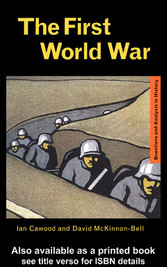
The First World War

von: Ian Cawood, David McKinnon-Bell
Routledge, 2000
ISBN: 9780203179871
Sprache: Englisch
193 Seiten, Download: 1720 KB
Format: PDF, auch als Online-Lesen
2 RECRUITMENT AND PROPAGANDA (p. 22-23)
BACKGROUND NARRATIVE
The initial months of the war were in fact the most decisive. The Germans failed to destroy the French army, faced with unexpected Belgian resistance and a French and British retreat, which prevented the Allies suffering the fate of encirclement which had befallen the French in 1870. Instead the Allies fought back at the Marne and pushed the Germans back to a line 50 miles from the French capital.There the Germans dug in, deciding to wait for the Allies to bring the war to them, as the current military technology of machine gun, barbed wire and heavy artillery favoured a defensive approach.
Meanwhile the unexpectedly swift invasion of East Prussia by the Russians had diverted two German divisions from the west at a vital moment, but left the Russian forces divided and over-stretched. General Hindenburg was brought out of retirement and, with his able quarter-master general, Eric Ludendorff, managed to inflict crushing defeats on the two Russian armies in East Prussia at Tannenberg and the Masurian Lakes. The Germans swiftly advanced into Russian Poland, but any further advances were halted by the onset of winter. The Russians had more success in the south against the Austrian army, invading the Austro-Hungarian Empire, but the war had cost hundreds of thousands of Russian casualties before Christmas 1914.
For all the powers, as hopes of swift victory were dashed, realisation grew that in this war victory depended on more than the physical bravery of the soldiers.The ability to replace losses and supply armies with all the resources they needed to keep fighting, both hightechnology weapons and basic necessities,would determine a nation’s chances of victory in a large-scale, long-duration war. The governments of Europe therefore turned, with varying degrees of urgency, to the task of involving the whole of their population in the war effort and convincing them that the sacrifices and commitment required were justified by the cause in which they served. Military authorities were, inevitably, cautious in revealing information which may have been of help to the enemy, but most censorship was actually self-imposed by the press.
During September 1914, French newspapers failed to accurately report the colossal scale of French losses. In the following month, the loss of the British battleship Audaciouswas not mentioned, despite the wreck being seen by passenger liners on their way to America. Most notoriously, newspapers reported that soldiers viewed war with enthusiasm and were disdainful of its dangers. In France, where war was seen as unwanted, but unavoidable, propagandists emphasised the soldiers’ alleged patriotism and gaiety in the face of death. A correspondent told readers of Le Petit Parisien that ‘our troops laugh at the machine guns now. . . . Nobody pays the slightest attention to them’, while Echo de Paris reported the story of one wounded soldier:‘My wound? It doesn’t matter. . . . But make sure you tell them that all Germans are cowards and that the only problem is how to get at them.’ Stories of soldiers kicking footballs towards the enemy and looking forward to a ‘scrap’ continued throughout the war, and, in the accounts of soldiers, did more to distance the realities of life on the front line from the patriots on the Home Front.
The most famous propaganda technique employed in the First World War, which all governments and most journalists used, was that of the atrocity story. In Britain especially, where there was a need after 1914 to keep up the flow of volunteers, such stories flourished. One of the earliest stories, that of Grace Hume, a 23-yearold nurse, appeared in the Evening Standard, Pall Gazette, Westminster Gazette and The Star in September 1914. The report described how invading German soldiers at Vilvorde in Belgium had attacked a camp hospital, killing wounded soldiers, and then cut off Nurse Hume’s breast.







